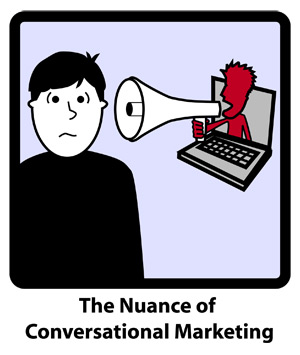 It seems that a key distinction between bloggers and journalists is that bloggers tend to be more active in marketing their content on the web. However – they may not call it that – it may simply be referred to as participating in the online conversation.
It seems that a key distinction between bloggers and journalists is that bloggers tend to be more active in marketing their content on the web. However – they may not call it that – it may simply be referred to as participating in the online conversation.
As power shifts from traditional display advertising and media channels, many businesses are exploring “conversational marketing.” This may involve content creation, and marketing and marketing strategies that engage their customers where they like to hang out, as opposed to innundating them with a single message in the mass media.
John Battelle feels that the “conversaton” on the web will become an essential part of online business:
“…adding value to a customer’s life through marketing will be seen as a necessity as opposed to an experiment. This is the logical extension of the search marketing revolution to all forms of marketing, well beyond direct response and the fulfillment of declared intent.”
Rex Hammock is asking businesses to let go of the concept of owning the message and the channels by which they are delivered:
“…we’re all in the media business.”
“When your business model is based on metrics measuring loyalty and action, your digital strategy is less focused on page views and traffic and more focused on engagement and results. Most importantly, the digital strategies of associations and corporate marketers should be more focused on distribution of loyalty- and action-oriented content, rather than on advertising-based business models revolving around the conversion of “eyeballs” into page views or click-throughs.”
And it is not just about creating conversations about your specific brand or business.
The New York Times profiles the ice cream company Denali, which has created a financial planning blog in order to put their ads in front of readers of this content:
“…by far the most successful blog, in terms of traffic, turned out to be Free Money Finance, a blog that has nothing to do with Denali’s business. Mr. Nardini’s plan was to create a blog with so much traffic that it could serve as an independent media outlet owned by Denali Flavors, where the company could be the sole sponsor and advertiser.”
“He chose personal finance because it is a popular search category on the Web and because he knew he would not tire of posting about it. And post he does, about five times each weekday.”
Many are beginning to leverage the microblogging service Twitter in order to connect with others, and become a part of the conversation. Dan Zarrella offers 10 Ways Twitter Can Boost Your Social News Profile:
- Match Your Usernames and Avatars
- Search Twitter for Twitter Users Mentioning Your Favorite Social Site
- Search Google for Profiles on Your Favorite Social News Sites Mentioning Twitter
- Link to your Twitter Account from All Your Social Profiles
- Ask Readers of Your Blog to Follow You
- “Twitter-jack” Active Social News & Twitter Users’ Friends
- Ask Questions
- Don’t Just Spam Twitter, Add Value
- Post the Title with the URL
- Consider Using a Social Media Specific URL Shortener
Social marketing is evolving quickly. For a more complete listing of online marketing methods, check out these two posts:
- Tamar Weinberg shares the best internet marketing blog posts of 2007, breaking them into the following categories:
- Social Media Sites: General
- Digg
- StumbleUpon
- Mixx
- del.icio.us
- Sphinn
- Social Media and Social Media Marketing
- General Internet Marketing
- Viral Strategies
- Link Resources
- Blogging: General
- Blogging: Inspiration
- Blogging: Promotion
- Content Generation
- Reputation Management
- Video Articles
- Business
- Search Engine Optimization
- Search Engine Stuff
- Web Development
- Search Marketing Tools
- Paid Search
- Recommended Books
- Affiliate Sites
- Domaining
- Jeremiah Owyang shares A Complete List of the Many Forms of Web Marketing for 2008. He breaks them down into the following topics:
- Corporate Domain
- Search Marketing
- Out Bound and Syndicated Web Marketing
- Brand Extension
- Community Marketing and Social Media Marketing
- Virtual Worlds
- Related Mediums (iTV & Mobile)
- Experimental (VRM & Social Graph)
And finally, John Battelle outlines how conversational media differs from a more traditional model of packaged goods media:
As these strategies take shape, you begin to see traditional lines erased. Content creators – even journalists – will begin to focus on spreading their message, and engaging their community online. Likewise, marketers will need to become experts in creating compelling content that goes deeper than many marketing messages of the past. Perhaps one day we will all be content creators and marketers… but we won’t call ourselves either.
